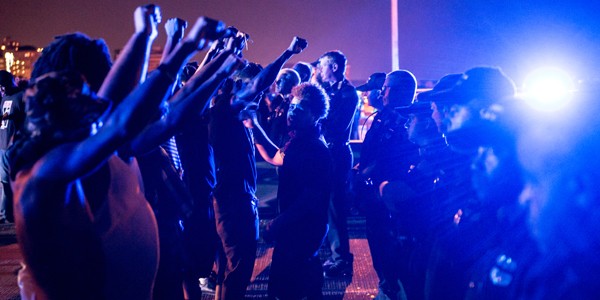 Brandon Dill
Brandon Dill
The now Memphis-infamous Bridge Protest was thousands strong, and the Memphis Police Department currently has roughly 2,000 officers. In the recent past, city officials have attributed the delay or complete denial of public assembly permits to a need to balance police resources and public safety for all involved.
The next Memphis City Council Public Safety and Homeland Security (PSHS) Committee meeting will feature two conversations pertinent to the recent increase in public demonstrations in Memphis, and the national conversation on police accountability.
The chairman of the PSHS committee, Worth Morgan, said that recent protests have pushed the application process for marches, parades, and protests to the forefront, and discussion around the process is needed at this point. The city currently requires 14 business days notice before issuing a public assembly permit.
“I wanted to have a conversation that asks, ‘Is 14 business days the best we can do?’ And that’s a conversation that has to involve the police and a better understanding of the logistics and the overtime pay involved, said Morgan.
The permit conversation is two-pronged, and the second part will center around the city’s exception to their public assembly ordinance that stipulates emergency permits can be granted if the event taking place is prompted by “Spontaneous events occasioned by news or affairs coming into public knowledge within three days of such public assembly”.
This exception was used to grant a permit for the pro-immigration march prompted by President Donald Trump’s so-called “Muslim Ban” on February 1 of this year. Initially though, organizers behind the rally were denied a permit under the 14-day stipulation.
The city also denied a permit last month to activists wanting to assemble to raise awareness of the ongoing conflict at Standing Rock.
According to the executive director for the Mid-South Peace and Justice Center, Bradley Watkins, the current process in place potentially reinforces apathy to current affairs.
“The only thing that the permit office accomplishes by dragging their feat on permits is that it teaches people not to bother,” noted Watkins.
Watkins maintains that it’s not the place of the permit office to decided whether or not people can protest. Rather, notifying the city is a courtesy and a way to facilitate communication between activists and police.
“The Police and the city can have communication with these activists, which can help things run smoothly…or not and have problems,” said Watkins.
Both Memphis Police Director Mike Rallings and the department’s chief legal officer, Bruce McMullen, are expected to participate in the permit discussion.
On Morgan’s part, the councilman has stated that he is “more than open” to amending the existing ordinance if the discussion identifies better practices.
The discussion around the use of body cameras on city police will examine recent data gathered by MPD’s Real Time Crime Center that shows a significant drop — roughly 75% — in civilian complaints since the implementation of body cameras.
Morgan says the conversation is a chance for the city’s Internal Affairs Bureau to add context around the drop in complaints.
“Off the top of their head, everyone can probably think of two reasons why that might be the case. One is the officers are behaving better, and two is that the citizens are behaving better as well,” said Morgan, who added that he recognizes that most people will have a bias towards which of the two reasons has contributed more to the drop in complaints.
Though the rollout of the body cameras was halted in 2016, Rallings has said that the majority of officers are now equipped with the recording technology.
As with the conversation around public assembly protests, Morgan again is hopeful that gleaning context from the discussion will provide helpful insight.
“I think it will be an interesting conversation,” Morgan said. “This is a chance to have a broad look at how body cameras have affected these investigations.”
The PSHS Committee will meet on Tuesday at 9:45 a.m. in City Hall.